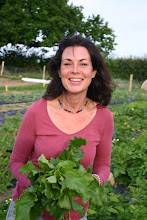Last night we sat outside and as the sun went down a mist settled upon the field like a shroud bringing a drop of dew to the gasping plants. Bats darted beneath a mauve, star speckled sky and the silhouettes of familiar trees took on eerie profiles.
This morning, up early and another cloudless, baby blue sky. The sun was already hot and harsh, the mown meadow parched and brown, dust from the cracked earth billowing underfoot. It feels like another country that we live in; the wild flowers that thrive this year are poppies, mallows, cornflowers and ox-eye daisies – their lives brief and stunning under the glare of this Mediterranean spell of summer. Marigolds and nasturtiums from last summer have self seeded everywhere and the garden is blasted with shots of hot colour.
But there is no time to stop and smell the roses because in the kitchen garden there is a race going on to see how fast every single vegetable can mature and run to seed in order to reproduce in these life threatening drought conditions. And the only thing that will stop this is water…
A heady combination of water and long hot sunny days should produce some bumper crops but in order to achieve this I feel like a nurse in a very busy ward running from plant to plant to administer just the right dose at the right time. Watering can’t be done at a leisurely pace throughout the day, it has to be done early in the morning or late in the evening, because there is a fine line between quenching a plant’s thirst or boiling it alive with an ill-timed lunchtime tipple in the heat of the midday sun.
Last summer, Dave and I – virgin smallholders – reared some pigs to help us dig a vegetable plot, then we threw some seeds in the ground and waited to see what would happen. Vegetables grew and so did the weeds, in abundance. We hunted for the vegetables we had planted, harvested a surprising amount and brought them in for use in the Tin Drums.
This year we’re a bit more in control even though it doesn’t feel like it most of the time. We have our small Land Army for a start. Charlotte and I are in charge of the kitchen garden, racing as fast as we can to get the last of the hundreds of leeks in for the winter, nurturing the tomatoes and peppers in the scorching heat of the greenhouse, checking beneath the horticultural fleece that protects the magnificent brassicas from the dreaded cabbage white butterfly which decimated our entire crop last year, and harvesting whatever has ripened overnight.
Dave and Matt the Chef are in charge of charcuterie. We now have a small field kitchen out at the smallholding and facilities for smoking and hanging our cured meats. We are making everything from air dried ham, chorizo and bacon through to the pork pies and pates – all now on the Tin Drum menu. The herbs and fresh ingredients used come straight from the herb bed or the kitchen garden the minute they are needed; nothing hangs around getting past its best.
Since I last posted a blog entry, Rose, our oldest daughter has finished her degree and started work full time at Seven Dials Tin Drum and it is now, more than ever, a family business. Rose was just nine years old when we opened the first Tin Drum at the Dials. That was way back in 1998 when bars were smoky, food was Fusion and from far flung shores and climate change was still only registering with those who knitted their own sandals. Things have changed so much over little more than a decade and climate change and the credit crunch have affected all of our lives. We are looking closer to home for enjoyment now and that includes learning the delights of food that we can grow ourselves. Eleven years ago I hadn’t even grown cress on blotting paper and if anybody had told me I’d be growing and rearing food for the restaurants I’d have thought them quite insane. But things can change in the most unexpected of ways.



